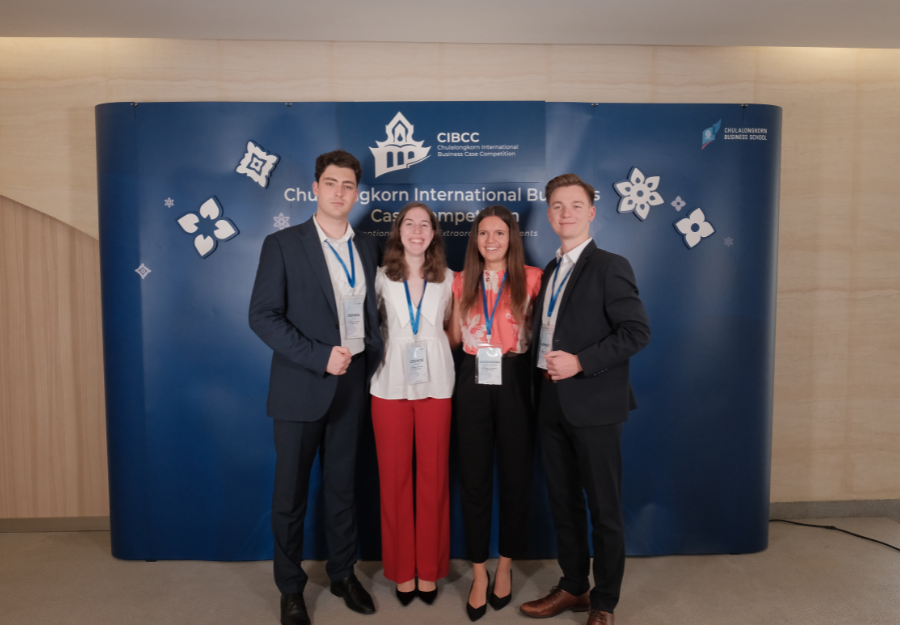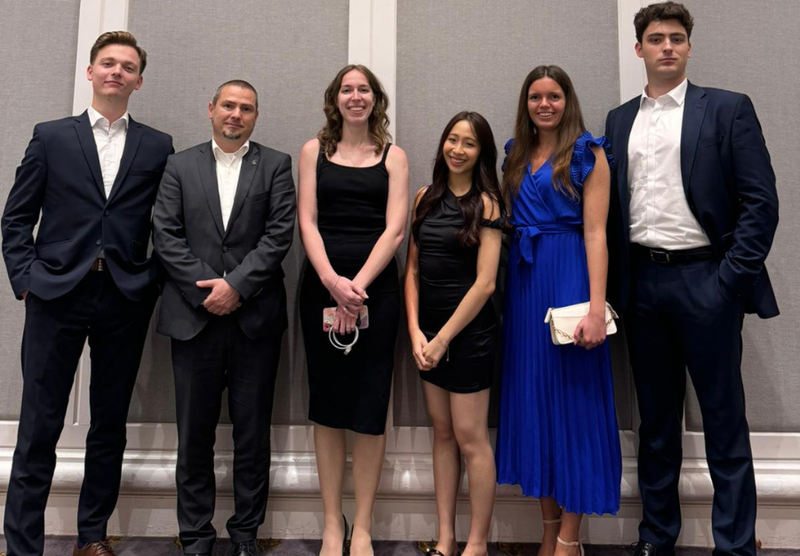Teamwork at the Core: How Corvinus Leveraged Insights and Team Dynamics at CIBCC

Between May 19th and 23rd, four undergraduate students from Corvinus represented our university at the prestigious Chulalongkorn International Business Case Competition (CIBCC) in Bangkok and HuaHin, Thailand. The competition took place again in a two-venue format, which provided additional excitement for the competing teams from all over the globe. Our team, consisting of Alexandra Pongrácz, Csenge Balogh, Henrik Szalay, and Norbert Stósz, competed against top universities from across the globe and earned a divisional fourth-place finish. The competition was won by serial winners RSM from our “do or die” division.
The team was selected and mentored by Dr. habil. Miklós Stocker, the head of the Institute of Strategy and Management. They earned the opportunity to compete at the international stage after finishing the Cases on International Business Strategy (CIBS) and Cases in Business Strategy (CBS) classes, at the end of their bachelor Case Track journey. Their preparation was focused on practical collaboration and team cohesion. The team solved 6 cases overall, with the last two focusing on the actual case companies. Henrik summarized the preparation as such:
“We did several preparation solvings, tried to get accustomed to each other, and find each other’s flow. We not only managed to improve our skills, but also became a really close team overall.” (Szalay Henrik)
The CIBCC format challenged participants with two intense case-solving rounds. There was an 8-hour case with 10 minutes to present and 10 minutes to answer questions. The focus for this one was on creating a marketing strategy for Phyathai Hospital Group. The other round was a 24-hour case, with 15 minutes to present after and 10 more minutes for the Q&A. The target company for this was TOA Paint, a leading paint and coating manufacturer in Southeast Asia. Contestants were asked to catapult TOA’s market presence in Vietnam.
“After the draw, we knew that qualifying from this division, where the top-tier teams, with extensive global competition experience, are with us, will need extra performance, and we also guessed that the division winner will likely be the overall winner.” (Miklós Stocker)
After the presentations, the judges lauded the team’s efforts in understanding the case.
“The jury highlighted that our analysis was so thorough and well-grounded that it felt like we had been working at the company for years. They appreciated the depth of our understanding, which was really encouraging to hear.” (Alexandra Pongrácz)
“Our team did a very bold solution in the first case, which could have been a game changer if the jury bought it, which they sadly didn’t. Learned from this, the team went for a lower risk, but very complex solution for the second case, which I am very proud of. The RSM team, on the other hand, delivered two wow-effect presentations with one outside-the-box addition to their conservative solutions in each, utilizing business IT competencies on top of the regular strategic case-solving skills. They scored a well-deserved victory, which was their fourth in a row in the global circuit.” (Miklós Stocker)
The Corvinus team placed great emphasis on team dynamics throughout the competition. Tasks were divided according to each member’s strengths, and beyond working professionally, the group built meaningful personal connections. Many members said this was one of the best teams they had ever worked with, as remarked by Norbi:
“Our teamwork was professional and fun at the same time. We were able to work well together and complement each other. Moreover, we were always able to have a laugh, which significantly improved the overall vibe of the case solving and the teamwork.” (Norbert Stósz)
Overall, the team left CIBCC satisfied with their own personal development. They learned how much mutual trust and respect can influence the case-solving experience. They are all in agreement that it was the mutual support they provided each other that helped them perform under the immense pressure.
“The biggest thing I took away from the competition? How amazing it feels to be in a team where we truly got each other’s backs, can count on one another, and talk things through clearly, calmly, anytime. That kind of connection is gold to me” (Alexandra Pongrácz)
Reflecting on their results, the team felt they had done all they could and were satisfied. Csenge described the team’s mindset after the closing ceremony as such:
“There are some things that you cannot prepare for, but blaming the environment for all your results is idiocy; The most important thing is to never stop believing in yourself and to learn from the results but keep it objective and not take the results too much to your heart whether you are satisfied with that or not.” (Csenge Balogh)
The team was grateful for the opportunity to compete at the highest level and meet with some of the most promising young talents across the globe. The networking opportunity and social experience provided by the competition will remain lasting memories.
Congratulations to Alexandra, Csenge, Henrik, Norbert, and their mentor Dr. Miklós Stocker. Special thanks to all the Case Track instructors, participating jury members at the case practice presentations, and CCTC mentors who supported the team’s development. We look forward to seeing where the next competition takes us!
